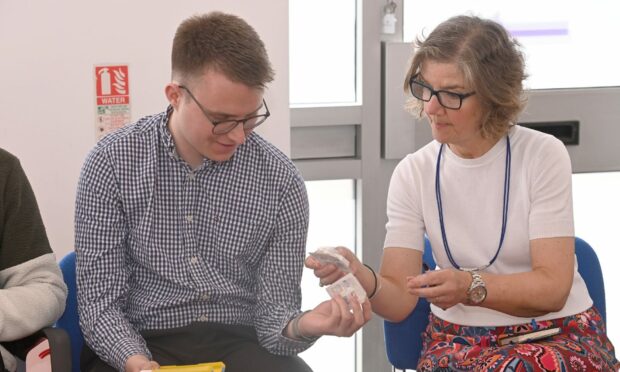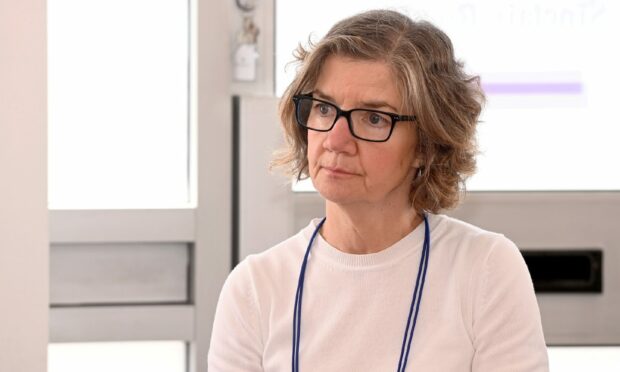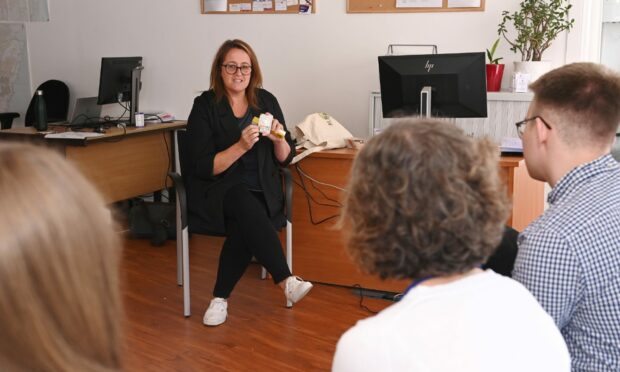A former detective turned politician is drawing on her experience on the front-line to help save lives from overdoses in Aberdeen.
Audrey Nicoll has been trained to administer Naloxone – which already saves an average of almost one life every week in the north-east.
It can reverse the effects of opioids such as heroin, methadone, opium, codeine or morphine.
The former detective sergeant says a 31-year career in the police opened her eyes to the terrible impact of drug harm.
‘Ripple effect’
“I’ve been lucky – if that’s the right word to use – in being able to understand the ripple effect of harm and that drug harm and drugs deaths has a devastating impact on families, on children living with drug dependency and the way in which it impacts long-term as well as in the immediate period,” she said.
Mrs Nicoll – the MSP for Aberdeen South and North Kincardine – was inspired to contact city-based charity Alcohol and Drugs Action to receive naloxone and overdose awareness training for herself and staff.
The team now has the ability to distribute naloxone kits to those who need them, as well as administer the drug should they come across someone having an overdose.
As part of International Overdose Awareness Day – which takes place today – the charity arranged a series of naloxone training events across Aberdeen city.
Work is under way to encourage different sectors such as the police, paramedics, fire services and others to use the medication in the case of an overdose.
What is naloxone and how is it used?
Naloxone is a medication that can temporarily reverse the effects of an opioid-related overdose.
It is safe to use even if the person administering the drug is unsure what drugs have been taken or even if no drugs have been taken.
It can be used either as an injection to the outer thigh or upper arm or by using a nasal spray.
It starts to wear off after 20 to 30 minutes but can buy a person time until an ambulance arrives, or they can be seen by a medical professional.
In 2011, Scotland was the first country in the world to introduce a national naloxone programme.
Speaking to The Press and Journal at her Torry constituency office, Mrs Nicoll said her professional background and current role as convener of Holyrood’s criminal justice committee made her aware of developments around naloxone.
She thinks widening out naloxone training will “definitely” help in the fight to tackle Scotland’s drugs death crisis.
There were a total of 1,330 drug deaths recorded in Scotland last year – a small 1% decrease on the previous year – but still the second highest annual total on record.
Figures show there were 62 drug deaths in Aberdeen – a rise of 10% – a new record for the city.
Mrs Nicoll said: “I think we need to be a little bit more open minded in relation to what could be done beyond it just being the responsibility of our healthcare colleagues or social work colleagues or third sector colleagues.
“There are lots of people that interact with individuals and families living with drug harm and drug dependency who with the right training are in a strong position to be able to assist and potentially save a life.
“Given the scale of the problem, given the complexities of it, I think it’s absolutely appropriate that we think a bit out of the box and look at how we can all as public servants fulfil a role in that.”
The SNP MSP said she saw “up close and personal” the scale of the issue during a police career spanning more than three decades.
Gillian Maclean, team leader at Alcohol and Drugs Action, who delivered training to Mrs Nicoll and her team, is passionate about raising awareness of naloxone.
She said: “We see the impact on individuals and their families where substances can affect them.
“1,330 folk dying in Scotland; it doesn’t have to be that way.
“We’ve got a fantastic, life-saving drug naloxone given out free of charge.
“It’s about getting that message out there that it’s safe for anyone to use.”
Additional help and support can be found from Alcohol and Drugs Action which is open seven days a week in Aberdeen.
They provide help and advice on accessing all types of care and support for people and their friends and family.
- Freephone 0333 3448 355 or 01224 594700 or 07927 192706.
- Naloxone kits are available to take home from community pharmacies.
- Naloxone kits can also be accessed from ADA.



